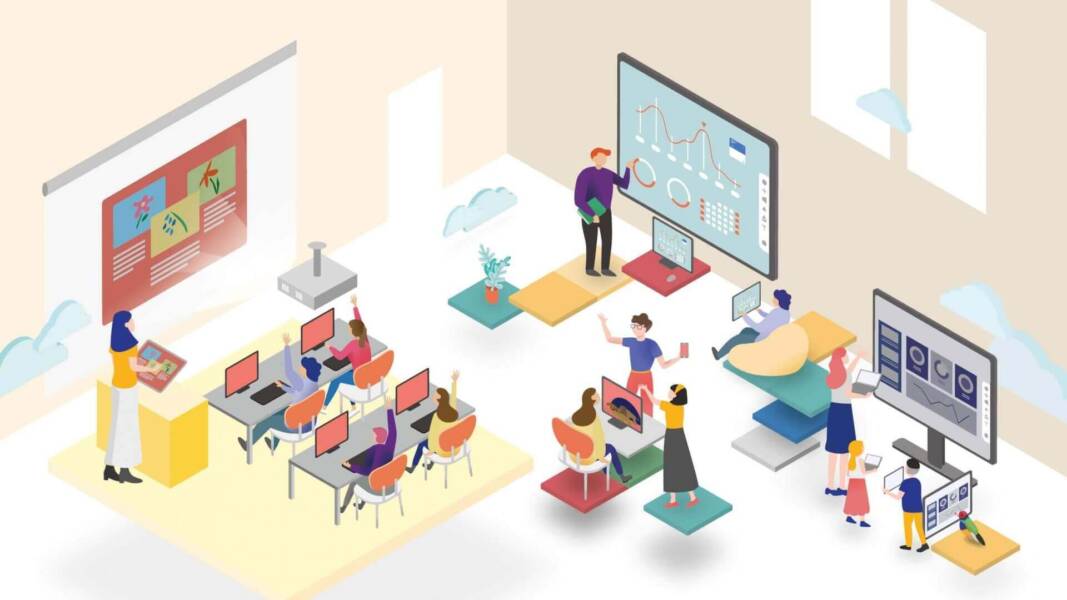Technology has become an integral part of modern education, revolutionizing the way teachers instruct and students learn. From interactive whiteboards to AI-driven personalized learning, the classroom is evolving rapidly. In this article, we’ll explore the current state of classroom technology and glimpse into the future innovations set to transform education further.

1. The Current Landscape of Classroom Technology
Today’s classrooms are equipped with a variety of technological tools designed to enhance learning experiences:
-
Interactive Whiteboards: Replacing traditional chalkboards, these allow dynamic presentations and interactive lessons.
-
Learning Management Systems (LMS): Platforms like Moodle and Canvas enable teachers to distribute materials, assign tasks, and track student progress.
-
Educational Apps and Games: Applications such as Kahoot! and Duolingo make learning engaging and accessible.
-
1:1 Device Programs: Many schools provide each student with a tablet or laptop, facilitating digital learning.
2. Benefits of Integrating Technology in Education
Incorporating technology into the classroom offers numerous advantages:
-
Enhanced Engagement: Interactive tools and multimedia content capture students’ attention and make learning more enjoyable.
-
Personalized Learning: Adaptive software can tailor educational content to individual student needs, promoting better understanding.
-
Collaboration Opportunities: Digital platforms enable students to work together on projects, even from different locations.
-
Immediate Feedback: Online quizzes and assessments provide instant results, helping students identify areas for improvement.
3. Emerging Technologies Shaping the Future of Classrooms
Several cutting-edge technologies are poised to redefine education:
-
Artificial Intelligence (AI): AI can assist in grading, provide personalized tutoring, and identify students’ learning patterns.
-
Virtual and Augmented Reality (VR/AR): These technologies offer immersive learning experiences, such as virtual field trips or interactive science simulations.
-
Wearable Devices: Tools like smartwatches can monitor student engagement and health, providing data to tailor learning experiences.
-
Internet of Things (IoT): Connected devices can automate attendance, adjust lighting based on activity, and more.
4. Challenges in Implementing Classroom Technology
Despite the benefits, integrating technology in education comes with challenges:
-
Cost: Acquiring and maintaining technological tools can be expensive for schools.
-
Training: Teachers need proper training to effectively use new technologies.
-
Equity: Ensuring all students have equal access to technology is crucial to prevent widening the digital divide.
-
Privacy Concerns: Protecting student data is paramount as more information is stored digitally.
5. Strategies for Effective Technology Integration
To successfully incorporate technology into the classroom, consider the following strategies:
-
Professional Development: Provide ongoing training for educators to stay updated with technological advancements.
-
Pilot Programs: Test new tools on a small scale before full implementation to assess effectiveness.
-
Feedback Mechanisms: Gather input from students and teachers to refine technology use.
-
Collaborative Planning: Involve all stakeholders, including parents and administrators, in decision-making processes.
6. The Road Ahead: Future Predictions
Looking forward, several trends are expected to influence classroom technology:
-
Increased AI Integration: AI will play a more significant role in customizing learning experiences and administrative tasks.
-
Global Classrooms: Technology will enable students from different parts of the world to collaborate seamlessly.
-
Gamification: Incorporating game elements into learning will continue to motivate and engage students.
-
Data-Driven Decisions: Analytics will inform teaching strategies and curriculum development.
Conclusion
Technology is undeniably transforming education, offering innovative ways to enhance teaching and learning. By embracing these advancements thoughtfully and addressing associated challenges, educators can create dynamic, inclusive, and effective learning environments.
TechnologyHQ is a platform about business insights, tech, 4IR, digital transformation, AI, Blockchain, Cybersecurity, and social media for businesses.
We manage social media groups with more than 200,000 members with almost 100% engagement.






































